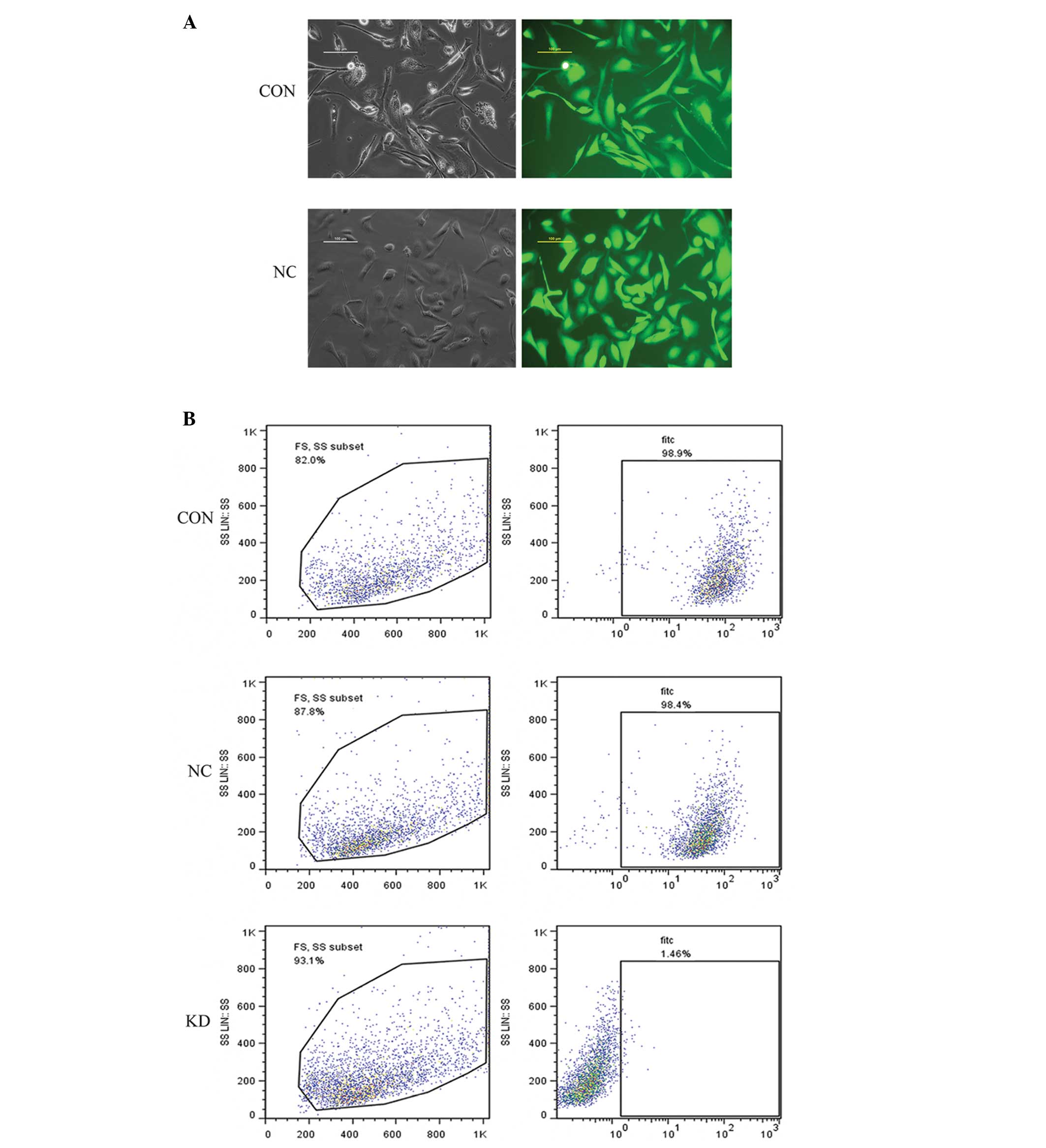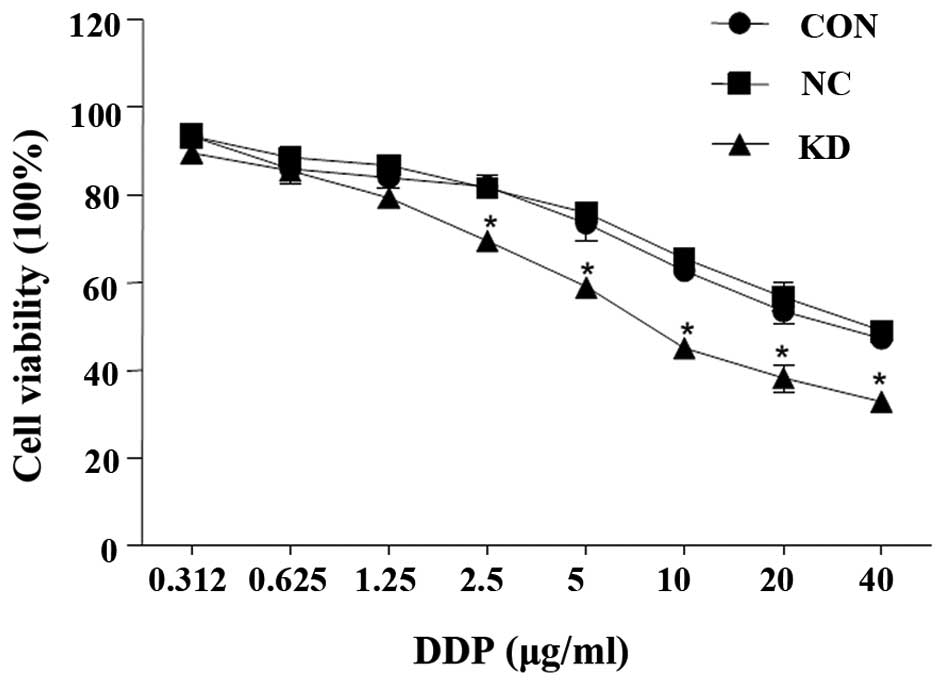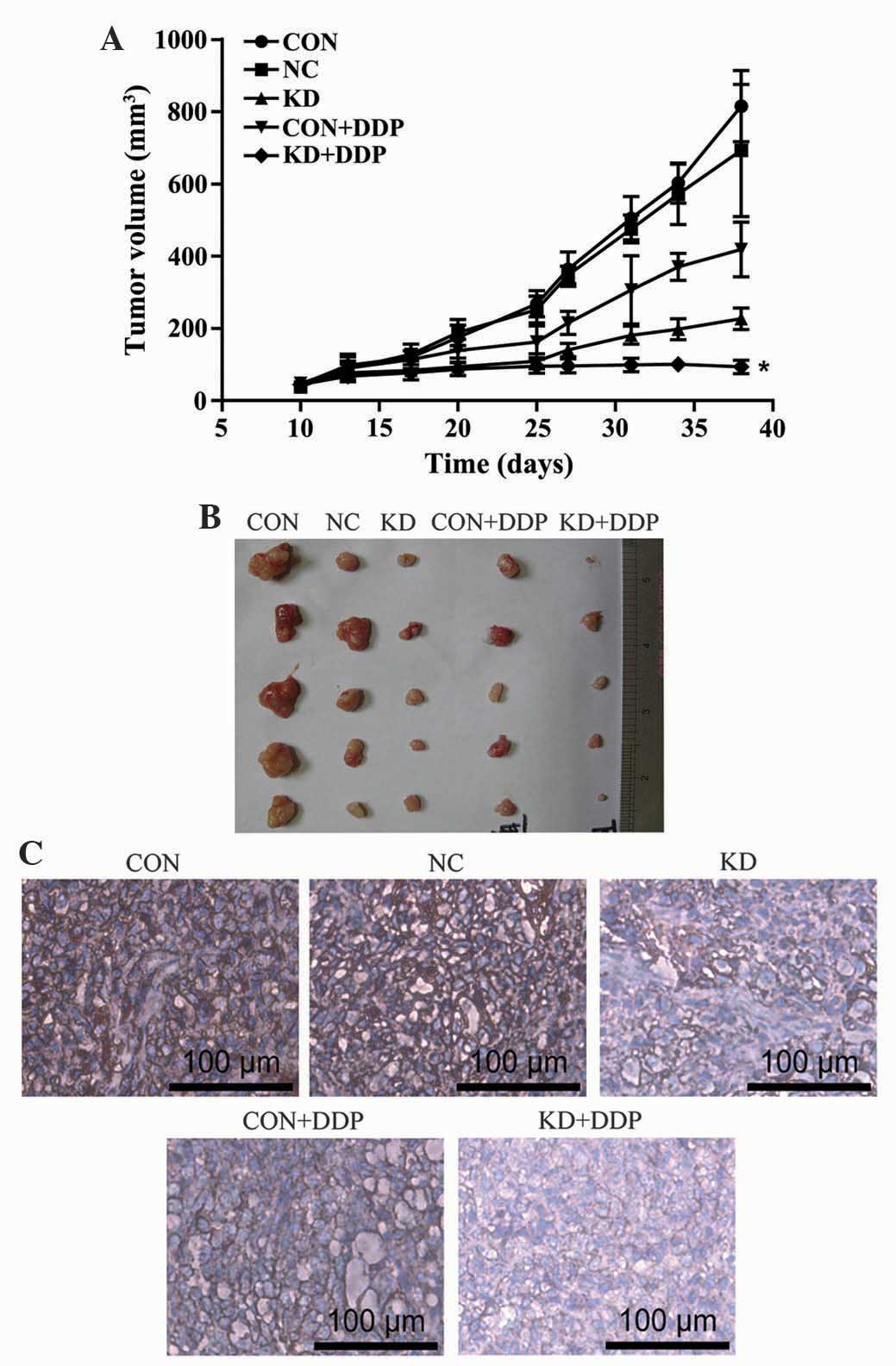|
1
|
Siegel R, Naishadham D and Jemal A: Cancer
statistics, 2013. CA Cancer J Clin. 63:11–30. 2013. View Article : Google Scholar : PubMed/NCBI
|
|
2
|
Salani R, Santillan A, Zahurak ML, et al:
Secondary cytoreductive surgery for localized, recurrent epithelial
ovarian cancer: Analysis of prognostic factors and survival
outcome. Cancer. 109:685–691. 2007. View Article : Google Scholar : PubMed/NCBI
|
|
3
|
Helm CW: Current status and future
directions of cytoreductive surgery and hyperthermic
intraperitoneal chemotherapy in the treatment of ovarian cancer.
Surg Oncol Clin N Am. 21:645–663. 2012. View Article : Google Scholar : PubMed/NCBI
|
|
4
|
Lu YM, Rong ML, Shang C, et al:
Suppression of HER-2 via siRNA promotes apoptosis and decreases
metastatic potential of SKOV3 human ovarian carcinoma cells. Oncol
Rep. 29:1133–1139. 2013.PubMed/NCBI
|
|
5
|
Baselga J and Arteaga CL: Critical update
and emerging trends in epidermal growth factor receptor targeting
in cancer. J Clin Oncol. 23:2445–2459. 2005. View Article : Google Scholar : PubMed/NCBI
|
|
6
|
Camilleri-Broët S, Hardy-Bessard AC, Le
Tourneau A, Paraiso D, Levrel O, Leduc B, Bain S, Orfeuvre H,
Audouin J and Pujade-Lauraine E: GINECO group: HER-2 overexpression
is an independent marker of poor prognosis of advanced primary
ovarian carcinoma: A multicenter study of the GINECO group. Ann
Oncol. 15:104–112. 2004. View Article : Google Scholar : PubMed/NCBI
|
|
7
|
Lanitis E, Dangaj D, Hagemann IS, et al:
Primary human ovarian epithelial cancer cells broadly express HER2
at immunologically-detectable levels. PLoS One. 7:e498292012.
View Article : Google Scholar : PubMed/NCBI
|
|
8
|
Neve RM, Lane HA and Hynes NE: The role of
overexpressed HER2 in transformation. Ann Oncol. 12(Suppl 1):
S9–S13. 2001. View Article : Google Scholar : PubMed/NCBI
|
|
9
|
Tai W, Mahato R and Cheng K: The role of
HER2 in cancer therapy and targeted drug delivery. J Control
Release. 146:264–275. 2010. View Article : Google Scholar : PubMed/NCBI
|
|
10
|
Yu D and Hung MC: Role of erbB2 in breast
cancer chemosensitivity. BioEssays. 22:673–680. 2000. View Article : Google Scholar : PubMed/NCBI
|
|
11
|
Berchuck A, Kamel A, Whitaker R, et al:
Overexpression of HER-2/neu is associated with poor survival in
advanced epithelial ovarian cancer. Cancer Res. 50:4087–4091.
1990.PubMed/NCBI
|
|
12
|
Tan DS, Ang JE and Kaye SB: Ovarian
cancer: Can we reverse drug resistance? Adv Exp Med Biol.
622:153–167. 2008. View Article : Google Scholar : PubMed/NCBI
|
|
13
|
Fire A, Xu S, Montgomery MK, et al: Potent
and specific genetic interference by double-stranded RNA in
Caenorhabditis elegans. Nature. 391:806–811. 1998.
View Article : Google Scholar : PubMed/NCBI
|
|
14
|
Draz MS, Fang BA, Zhang P, et al:
Nanoparticle-mediated systemic delivery of siRNA for treatment of
cancers and viral infections. Theranostics. 4:872–892. 2014.
View Article : Google Scholar : PubMed/NCBI
|
|
15
|
Meister G and Tuschl T: Mechanisms of gene
silencing by double-stranded RNA. Nature. 431:343–349. 2004.
View Article : Google Scholar : PubMed/NCBI
|
|
16
|
Brodersen P, Sakvarelidze-Achard L,
Bruun-Rasmussen M, et al: Widespread translational inhibition by
plant miRNAs and siRNAs. Science. 320:1185–1190. 2008. View Article : Google Scholar : PubMed/NCBI
|
|
17
|
Tuschl T: Expanding small RNA
interference. Nat Biotechnol. 20:446–448. 2002. View Article : Google Scholar : PubMed/NCBI
|
|
18
|
Bristow RE, Tomacruz RS, Armstrong DK,
Trimble EL and Montz FJ: Survival effect of maximal cytoreductive
surgery for advanced ovarian carcinoma during the platinum era: A
meta-analysis. J Clin Oncol. 20:1248–1259. 2002. View Article : Google Scholar : PubMed/NCBI
|
|
19
|
Ali AY, Farrand L, Kim JY, et al:
Molecular determinants of ovarian cancer chemoresistance: New
insights into an old conundrum. Ann N Y Acad Sci. 1271:58–67. 2012.
View Article : Google Scholar : PubMed/NCBI
|
|
20
|
Takehana T, Kunitomo K, Suzuki S, et al:
Expression of epidermal growth factor receptor in gastric
carcinomas. Clin Gastroenterol Hepatol. 1:438–445. 2003. View Article : Google Scholar : PubMed/NCBI
|
|
21
|
Yang G, Cai KQ, Thompson-Lanza JA, Bast RC
Jr and Liu J: Inhibition of breast and ovarian tumor growth through
multiple signaling pathways by using retrovirus-mediated small
interfering RNA against Her-2/neu gene expression. J Biol Chem.
279:4339–4345. 2004. View Article : Google Scholar : PubMed/NCBI
|
|
22
|
Roh H, Pippin J and Drebin JA:
Down-regulation of HER2/neu expression induces apoptosis in human
cancer cells that overexpress HER2/neu. Cancer Res. 60:560–565.
2000.PubMed/NCBI
|
|
23
|
Dullaers M, Van Meirvenne S, Heirman C, et
al: Induction of effective antitumor immunity by direct in
vivo administration of lentiviral vectors. Gene Ther.
13:630–640. 2005. View Article : Google Scholar
|


















